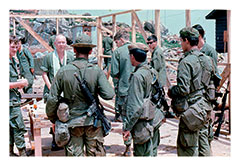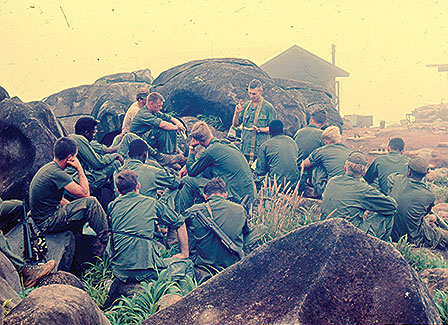 |
|||||||||
|
January/February 2017 Letters
It was nice to see an article about chaplains in Vietnam. I was glad to read that Chaplain Marshall got home okay. I remember the day he came out to the field by chopper and then had to spend the night because it got too late to send another one out to pick him up. We spent hours just talking. It was almost like being back home with my own minister. Thanks to all the chaplains then and now for serving God and country. Charlie “Nitro” Glisson LIFER CHAPLAINS I served as a chaplain’s assistant in the 1st Infantry Division in Vietnam. I enjoyed your recent article. I found your reference to “lifers” very interesting. In the Chaplain’s Corps there were lifer chaplains who wanted to keep their jobs and their pensions so they wouldn’t stand up for individual soldiers in need. There were also the volunteers, such as the Ranger Rabbi and Jesuit priests, who would stand up for their men and oppose the commanders. I was proud to serve with Fr. Rene Gelinas, a La Salette missionary, who always placed the needs of individual soldiers first and foremost. Robert S. Minetz PURVEYORS OF FOLKTALES As a wounded Vietnam veteran, I hold Navy corpsmen in the highest regard. I never felt the same about chaplains, thinking of them as purveyors of superstitious folktales contrary to the voice of reason. I saw their contribution to the efforts of the Corps and the U.S. armed forces as essentially useless. I always assumed that the individual churches paid their way for these guys and their promulgation of beliefs. I was shocked to find out that chaplains draw military pay. The U.S. taxpayers pay the freight for these guys, and pay them as officers. Let them be attached to the military, perhaps, but certainly their religions should be on the hook for their pay and benefits. Michael Burton THE BRUSH-OFF I couldn’t even bring myself to read Mr. Triplett’s article about chaplains in Vietnam in its entirety. It brought back a bad memory. I am sure most of chaplains did faithfully minister to their flocks of believers. In early 1969 I only had a few months of my tour left to go. I suppose I was feeling the short timer’s jitters, and a soldier in my company had committed suicide. I had been out on a short range patrol, so I missed several chaplains who came out to our perimeter after the sad incident. I noticed a chaplain sitting on the FB helicopter pad waiting for his ride back to the rear. I approached him and told him that I wasn’t Catholic but asked if I might talk to him. He glanced up from his paperback book and told me that I’d have to see a Protestant chaplain. He then went back to his book. As I walked away, I wondered how I was supposed to see another chaplain out here in the bush. He didn’t bother to take my name, or tell me that he could send another chaplain out to see me. Nothing. Decades later I learned that chaplains were trained to minister to soldiers of all faiths. I wonder sometimes if I was the only soldier to ever get the brush off. To this day I don’t care for any organized religion, rather believing in an individual human being’s inherent goodness. Sadly, this particular priest didn’t have the goodness to spare a few minutes for a young grunt. Paul Pagliaro In the November/December issue, Manitowoc, Wisconsin, Chapter 731 indicated that during a funeral service there was a 21-gun salute. While I have no doubt that they meant sincere respect for the deceased, this should be corrected. I served as commander of the Sixth U.S. Army Honor Guard for two years. A 21-gun salute is only given a chief of state, in our case the President of the United States. This is done with cannon fire every five seconds, as per AR 600-25. The firing of three volleys dates back to Roman times, when friends and relatives of the deceased pronounced the word “vale” three times, meaning farewell. For ceremonial firing, the firing party consists of not more than eight and not less than five. I don’t mean this to be critical, but I hope it will be helpful. Thomas S. Oliver NEVER FORGOTTEN Just a thank you for the story, “When Did the Vietnam War Start…” Your mention of Spec.4 James (Tom) Davis was greatly appreciated. He and the nine South Vietnamese soldiers who died with him were true heroes. Tom left behind a wife pregnant with their first child. They lived in a small town in eastern Tennessee. We will never forget him. Donald Zamora ACTUAL LOSSES As always I enjoyed reading my VVA magazine, but would like to point out an error in Marc Leepson’s “When Did the War Start…and End?” The actual losses during the Mayaguez operation were: twenty-five USAF, fourteen USMC, and two USN. I invite all to visit kohtang.com to revisit that day and the people involved. Daniel Spahn Marc Leepson responds: Daniel Spahn is correct. Thirty-eight Marines, Airmen, and Navy Corpsmen lost their lives in the Mayaguez operation, and three men were missing in action. That includes twenty-three USAF personnel who died in a helicopter crash en route to the staging area in Thailand. We regret the error and thank Mr. Spahn for pointing it out.
Late 1970 I was befriended by a USMC sergeant who was attached to the military police while we were both stationed at Camp Pendleton. After a few months he brought me to his barracks to drink. I passed out after getting drunk. When I came to, I discovered he had removed my clothing and had rectally sodomized me. I was seventeen years old and sexually inexperienced. He did not explain why he did this to me and acted nonchalant. I felt confused, embarrassed, betrayed, scared, and—because he was an NCO—intimidated. Because the incident occurred in a military police barracks by a Marine sergeant, I felt I had no outlet for reporting the act. I felt that his comrades would not believe me or would protect him, and if I did report it, I feared reprisal. After the incident, he continued to follow and harass me, on and off base. On several occasions, he physically and sexually attacked me. On the last two assaults, I was able to fight back and escape. Contact with this sergeant ended late 1971. Needless to say, these events affected my life—both in terms of thinking and behavior—some years later. Unfortunately, I was unaware of why my thinking and behavior became maladjusted until some 20-25 years later after seeing articles related to PTSD and MST. I recently read “Predator’s Prey” in the January/February 2014 issue. Thanks for bringing the issue of military sexual assault to light. Veterans who experienced it need healing. That process can only come about through awareness. As an incarcerated veteran, the process for a PTSD/MST claim can be daunting. And counseling is tricky due to security issues in a prison setting connected to disclosure of MST. You may publish my letter. However, because of my incarceration, I ask that my name be withheld.
In 1991 Associate Judge Holdaway of the U.S. Court of Veterans Appeals wrote: “We do, however, caution those who adjudicate claims of incarcerated veterans to be certain that they tailor their assistance to the peculiar circumstances of confinement. Such individuals are entitled to the same care and consideration given to their fellow veterans.” Today, when an incarcerated veteran files a well-grounded disability claim, the VA is required to help the vet develop his or her claim. The VA often complies by scheduling the vet for a claim-related exam at a nearby VA medical facility. Incarcerated vets aren’t free and most state prisons won’t transport them to a VA facility for that purpose. And the VA has no authority to compel such transporting. When the vet doesn’t report for the exam, the claim is usually denied. The vet must then file and appeal and wait years for the claim to be finally adjudicated. Scheduling incarcerated vets for exams they can’t attend is a total waste of VA resources. Denying veterans’ claims for this reason is an inexcusable injustice. Increasing the backlog of claim appeals harms all vets appealing their claims, incarcerated or not. The VA’s actions are governed by law, but I’ve never heard of the VA complaining that they’re being forced to create this injustice. Why is that so? Doesn’t the VA serve all eligible vets? Have incarcerated vets with Honorable Discharges stopped being eligible for VA benefits? I’m a vet with two Honorable Discharges. Why haven’t the VA processes been “tailored to assist” me and my peers? It’s been twenty-five years since Associate Judge Holdaway called for a solution to “the peculiar circumstances of confinement.” When will it be done? James B. Dunbar OUR FOUNDING PRINCIPLE I read and re-read Marsha Four’s “True to its Founding Principle.” This article was very well written and hit home on several very important points. I served in Vietnam during 1966-68, for a total in-country time of more than twenty months. I was a Navy Seabee (E5 Builder) doing support duties in Da Nang both times. Having served in this non-declared war, I understand how many Vietnam veterans were treated when they returned to The World, and how being denied entry into other established veterans organizations and their clubs would make one feel. I was very fortunate: I never had to experience this type of shunning, but know others who did. I am a relatively new life member of VVA in Bellingham, Wash. I regret not being a member longer, but enjoy the organization immensely and the news and information provided by VVA. I also can see and understand both sides of the argument on expanding our membership to include veterans from the recent conflicts. However, as Marsha pointed out very well, longevity is not on our side. Our Founding Principle, “Never again will one generation of veterans abandon another,” is very powerful and direct. There are a few very important words in that principle: “never again” and “abandon.” They can almost stand alone. Yes, VVA was formed and the founders fought—and fought hard and long—to become the powerful organization it is today. Yes, it was founded based on Vietnam vets, but the world continues to spin and create new veterans. It is because of our numbers that we have gained what has been gained, not simply because we are Vietnam veterans. This is where that awful word—longevity—comes into play. As our Vietnam veteran brothers and sisters die off, we will lose our powerful presence in Washington, D.C., and the ability to keep and expand the benefits and rights we all deserve as veterans. We as an organization have probably a 25-30-year life span left. So, by excluding our newer brothers and sisters in our great organization, we are by default setting an ever-shortening life- span for the great organization we belong to. By not expanding our organization we are abandoning a couple of generations of fellow veterans—a principle we swore we would never do. Let’s look hard at including our newer brothers and sisters, and change our name to something that will represent us all—something like the VAVA, Vietnam and All Veterans of America (just a suggestion). That combined force would continue for decades and preserve what the founders of VVA fought for. Russ Harlan TOGETHER The members of the Douglas E. Dahill Memorial Chapter 732 at the Allen-Oakwood Correctional Institution in Lima, Ohio, believe that VVA should never consider the last man standing option. In the July/August issue, Frank Giroux’s “The Worth of a Dollar” described a dollar that was carried for twenty-two months during World War II, and on it were the names of the men who fought alongside this severely wounded veteran. Every Memorial Day the son saw and heard the story of the dollar bill. The day came in July of 1968 when that young man went to war. As he was about to board his flight to Vietnam, his father placed that very same dollar bill in the palm of the son’s hand. The young man carried it for eighteen months in Vietnam, and he also wrote on it the names of those men who served alongside him. We believe this article is one small example of why the ideology of the last man standing should not be tolerated. As the sons, daughters, grandchildren, nieces, and nephews of Vietnam veterans, we believe it is our turn to continue the journey you’ve begun. We are all part of a legacy you have created. There must be a way for all of us to continue to work together for a seamless transition from the Vietnam era to the next generation. Entrust that dollar bill to the next generation, and allow us to become the presidents, vice presidents, secretaries, treasurers, board members, and committee chairs. Allow us to continue to grow this wonderful and awe-inspiring organization you’ve created, instead of allowing it to die out and be forgotten when the last Vietnam veteran dies. We feel it is a duty and a privilege to insure that what you have built continues long after you are gone. As a son of a Vietnam veteran, I will never forget what my father did for our country. In furthering VVA’s cause, we pay homage to our fathers, grandfathers, and uncles. Tom Yanasak, Chapter 732
Vietnam Veterans of America is an organization for those who served our nation in Vietnam or during the Vietnam War era. Yes, it will eventually fade away, as did the Grand Army of the Republic (GAR). Is that really all that bad? We were organized for a purpose and we are fulfilling that purpose of service to our fellow Vietnam veterans. The GAR heritage lives on with the Sons of Union Veterans of the Civil War, the direct descendant of the GAR. If our descendants so choose, VVA, too, can live on with Sons of Vietnam Veterans, and with the complementary Daughters of VVA. There are also other groups that honor the descendants of other previous conflicts, such as the Sons of the American Revolution, United States Daughters of 1812, and the Daughters of Union Veterans of the Civil War. All veterans are served by the umbrella organization, the American Legion. All those with overseas conflict service are covered by the Veterans of Foreign Wars. Then there is the Disabled American Veterans. Do we need to turn VVA into another umbrella organization? I say not. I see that the Korean War Veterans Association is only open to those who served in Korea. What is interesting is that the KWVA offers free life membership to Gold Star parents and spouses, and to former Korean War POWs. I think that this is something that VVA should consider. So, no to opening up VVA to all. When the last man or women goes, the candle is extinguished knowing that we did our part and served our comrades. The already established umbrella groups can carry on the mission. John Baz-Dresch
|
|||||||||
|
|
|||||||||
The Military Working Dog Commemorative Stamp Drive needs your help. |
|||||||||
8719 Colesville Road, Suite 100, Silver Spring. MD 20910 | www.vva.org | contact us |
|||||||||





















 I worked as a 91G, Social Work/Psychology Specialist, for Co. D, 25th Med. Bn., of 25th Division at Tay Ninh. Capt. Patrick Adkins was a Catholic chaplain stationed at 45th Surgical Hospital across the road from our A&D.
I worked as a 91G, Social Work/Psychology Specialist, for Co. D, 25th Med. Bn., of 25th Division at Tay Ninh. Capt. Patrick Adkins was a Catholic chaplain stationed at 45th Surgical Hospital across the road from our A&D.